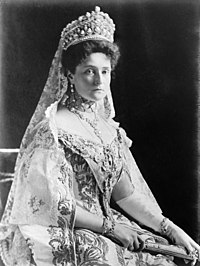
The doomed last Tsaritsa of Russia, Alexandra Feodorovna, has not fared well amongst historians. Jonathan Bromley dismissed her as "an awkward figure". Gareth Russell, in a sympathetic article exploring parallels between the Russian Empress and Marie Antoinette, queen of France and fellow victim of a political revolution, believed that Alexandra's poor reputation is "tragic", but also suggests that she was "a difficult personality". In 1976, Edward Crankshaw criticised her "instant and implacable hostility to the family into which she had entered" and believed that "she never made a worthy friend". Sixteen years earlier, popular historian Barbara Tuchman characterised her as "weak-witted", "hysterical", "morbidly suspicious" and criticised her for "hating everyone but her immediate family" - a view which somewhat contradicts Crankshaw's suggestion.
Hostility and dislike of Alexandra has not been confined to historians, of course. Her Russian subjects despised her as a "German bitch". She was resented and disliked for her supposed coldness - it has, however, convincingly been conjectured that this apparent reserve conveyed less a coldness than an unease or shyness. Her failure to give birth to a son also caused unrest and contempt; thus the birth of the Tsarevich Alexei in 1904 must have been of considerable relief to the royal couple. The context of the First World War played an essential role in fuelling dislike of the Empress; for her German birth alongside her devotion to the controversial and hated Grigory Rasputin intensified hostility to the Empress and played a significant role in the events which led to the demise of the ruling family, the Romanovs.

Above: The Winter Palace, St. Petersburg. Empress Alexandra never took to the palace, finding it cold and inhospitable.
On the other hand, Russian court memoirs, such as that written by the Empress' closest friend and lady-in-waiting Anna Vyrubova, paint a picture of a warm-hearted, kind woman devoted to her family and passionate about Russia. She was, famously, extremely religious and devoted to Nicholas II's cause. Theirs was a true love match, and of course, the two were together until the very end - mercilessly killed in the brutal tragedy at Ekaterinburg in 1918 alongside their young children. Possibly, Alexandra is one in a long line of unfortunate female consorts resented and disliked by their contemporaries on account of their foreign birth and because they were deemed responsible for their husbands' faults - one need only look at Margaret of Anjou and Marie Antoinette to discover that Alexandra's bitter experiences were hardly unusual.
It is important to separate facts from fiction. Alexandra was born on 6 June 1872 at the New Palace in Darmstadt to Louis IV of Hesse and Princess Alice of Great Britain, and was baptised Princess Viktoria Alix Helena Luise Beatrice of Hesse - though she was later known simply as Alix of Hesse. By virtue of her birth, she was granddaughter of Queen Victoria. Alix became close to her British grandmother, spending holidays with the British royal family. She espoused Victorian values and, according to some, was more suitable for rule as a British consort than as a Russian empress.

Above: Alexandra was born in Darmstadt in 1872.
In 1884, aged twelve, Alexandra met Nicholas Romanov, son of Tsar Alexander III, for the first time at the wedding of Grand Duke Serge, uncle of the Tsarevich, to Alix's sister Elizabeth in St. Petersburg. When Alexandra returned to Russia five years later she and Nicholas fell in love, an enduring romance that was to blossom into a relationship set to last for the next thirty years. Nicholas admitted in his diary at this time: "I have loved her for a long time, but more deeply and strongly since 1889 when she spent six weeks in Petersburg."
Initially, Nicholas' father opposed the marriage, for he wished his son to marry Helene, daughter of the Comte de Paris. However, the Catholic Helene refused to countenance a marriage to Nicholas, for it would have meant renouncing her faith in favour of the Russian Orthodox religion. Victoria herself also expressed misgivings about Alexandra's desire to marry Nicholas. Despite this, in 1894 Nicholas proposed to Alexandra and the two became engaged. In November of that year, Nicholas' father died and he became Tsar of Russia. Three weeks later, the new Tsar married Alexandra who, at twenty-two years of age, was now Empress of Russia. Her tenure would last twenty-three tumultuous years. In May 1896 the two participated in a lavish coronation in Moscow.

Above: The marriage of Nicholas II and Alexandra, by Laurits Tuxen.
The new Empress, as mentioned earlier, experienced difficult relations with her subjects. She seems to have found court protocol uncomfortable, and failed to establish warm relationships with her ladies-in-waiting and amongst Russian aristocratic women. Her preference for the plain Anna Vyrubova caused resentment and hostility. Despite these issues, Alexandra proved a fertile bride, giving birth to four daughters within the early years of her marriage: Olga (1895); Tatiana (1897); Maria (1899) and perhaps the most famous, Anastasia (1901). The long awaited male heir, Alexei, was born in August 1904. He was born with hemophilia, a tragic condition that was to culminate in the downfall of the ruling family, for it was this condition that led Alexandra to seek out the controversial guidance and support of Rasputin.
Hemophilia was fatal in the twentieth century. It was transmitted from Alexandra, who had had tragic personal experiences of the disease - her brother Frederick had died from it alongside an uncle, Leopold of Albany. Her sister also carried the disease. As a result, it was decided that Alexei's condition should be kept secret from the royal couple's Russian subjects. As Robert K. Massie makes clear in his famous study Nicholas and Alexandra (1967), this desire to maintain secrecy was tragically misinterpreted by the Russian peoples, who perceived an evil conspiracy at the heart of the palace concocted by the ruthless tsar and his evil German wife. They never understood that Nicholas and Alexandra were personally devastated by their son's condition and merely wished to retain discretion with regards to it.

Above: Alexandra and her son, Tsarevich Alexei.
It was Alexei's condition that provoked Alexandra into seeking the support of Grigory Rasputin, a reputed holy man and mystic who haled from Siberia. Alexandra was to regard him as a saint, but his closeness to the royal family provoked unease and hatred in Russian society. Disparaging remarks were made about the Empress' supposed relationship with Rasputin, and letters written from her to him were published in society, causing contempt and outrage. Nicholas was more reserved in his judgement of Rasputin, but he appears to have retained him at court as a means of pleasing and subjugating his wife. It is possible that he was unsure what other solutions were possible. Certainly Rasputin inspired controversy, for while some condemned him as a fraud, heretic and nymphomaniac, others regarded him as a saint and a living prophet. The crucial event came in 1912 when Alexei suffered a life-threatening haemorrhage in Spala, Poland. Rasputin sent a telegram stating: "The Little One will not die". Alexei miraculously survived, and from then on, Rasputin's advice was followed while his influence was assured at court. Eventually, Rasputin was murdered in 1916. The Empress' reputation by then was severely damaged, especially on account of her reliance on Rasputin.
The weakness of government, economic instability and the collapse of agricultural production caused unbearable living conditions in Russia during the First World War. The Tsar was blamed for military losses, having taken control of the military. The Empress was left in charge of government, an act that caused further hostility and resentment. One can only feel sorry for Alexandra, for she was acting on account of what she perceived to be her husband's, as well as her country's, best interests. Caught in an impossible situation, she faced hostility and censure from all quarters. There are several parallels with her life and that of Marie Antoinette, but this is perhaps the most disturbing one - the fact that she was embroiled in impossible circumstances with no way out, caught in the public eye. The spring of 1917 saw riots across Russia, and eventually, the royal family was placed under arrest at Tsarskoe Selo.

The last photograph of the Empress. She sits with her daughters Olga and Tatiana.
Alexandra was removed with her family to Tobolsk that August and remained there until after the Bolshevik Revolution in November of that year. In April 1918, she arrived with her daughter Maria at the Ipatiev House in Ekaterinburg, her final journey. The commander of the house, Alexander Avadeyev, regularly referred to the imprisoned Empress as a "German bitch" while criticising the deposed Tsar as "Nicholas the Blood-Drinker". The royal family led an unbearable existence here, paralysed by fear and uncertainty as to what the future held. In July 1918, plans were finalised to murder the royal family. On 17 July, the former tsar and tsaritsa were shot alongside their five children in the basement of the Ipatiev House by a detachment of Bolsheviks led by Yakov Yurovsky. The Empress' body was later stripped alongside that of her husband, children and some retainers, and was thrown down a disused mine-shaft at Ganina Yama before being buried under some railway sleepers. In the 1990s, the bodies of the majority of the Romanovs were discovered, and were reinterred in the St. Catherine Chapel of the Peter and Paul Cathedral of the Fortress of St. Peter and St. Paul in St. Petersburg. In 2000, Alexandra was canonised as a passion bearer by the Russian Orthodox Church together with her husband, children, sister and the nun Varvara.

Ekaterinburg's "Church on the Blood" was built on the spot where Ipatiev House, execution site of the Romanovs, once stood.
As we have seen, history has not been kind to Empress Alexandra Feodorovna. She has been criticised and condemned as a cold, irresponsible, suspicious, hysterical, even paranoid woman who cared for nothing but her family and resented her subjects. However, the truth is more complicated than that, as recent studies of the last Romanov rulers illustrate. Certainly, she suffered a brutal fate she in no way deserved; her life bloodily cut short with a loss of dignity. Her husband, the love of her life, had been killed only moments before. It was a tragic end for the last Romanov ruling couple in Russia. They deserve our sympathy and compassion. Although Alexandra had many faults, and was not a particularly successful politician, she was in many ways a devoted wife, a successful mother, and a good woman caught in impossible circumstances that devastated Russia and destroyed the royal family.
This comment has been removed by a blog administrator.
ReplyDeleteThis comment has been removed by a blog administrator.
ReplyDelete